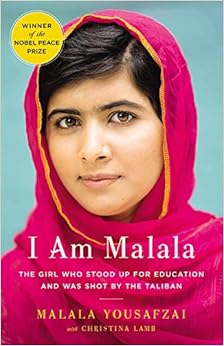All I really knew before reading “I Am Malala” was that Malala had won the Nobel Peace Prize and was a young woman who had been shot by the Taliban.
I now know a whole lot more, like the fact that she is from Pakistan and is as old as my younger brother (right now, 19). Even before she was shot, Malala was a well-known activist for children's right to education, particularly for girls. One doctor working on her after the attack described her as Pakistan's Mother Teresa.

One cool tidbit that you may not know is that she didn't have a last name originally and chose “Yousafzai” because it is the name of her tribe. Her father also uses the name and also is an activist for education.
In contrast with Alan Alda's memoir, Malala gave insight into her family. I can tell you she idolizes her father, her mother has great faith and is (or was) illiterate, and she argues often with one of her brothers (I believe she has two, but they did not get much emphasis, though they were sorry to leave behind their chickens when the family first had to evacuate their home in Swat, the valley of Pakistan they live in). Grandpa was a great speaker, Mom's family lives one valley over from Dad's, and her maternal cousins all think she's some big city girl (back when they were growing up; they probably think even more so now).
I feel like I got to know Malala, but I also feel like this book had a major focus on the history and politics of the region. It was like the history of Malala was the history of Pakistan and her people's place in it.
So in that way, it also wasn't personal. Since she co-wrote the autobiography, I'm left wondering whether she told the story and the other writer, Christina Lamb, wrote it down in whatever words seemed best or if she wrote the bulk of it herself and Lamb just helped. I do know she had people help her research the history of her region, so she didn't know all that off the top of her head.
Some storytelling techniques and autobiography ideas I saw and was intrigued by:
Oh, and because I loved this part:
So in that way, it also wasn't personal. Since she co-wrote the autobiography, I'm left wondering whether she told the story and the other writer, Christina Lamb, wrote it down in whatever words seemed best or if she wrote the bulk of it herself and Lamb just helped. I do know she had people help her research the history of her region, so she didn't know all that off the top of her head.
Some storytelling techniques and autobiography ideas I saw and was intrigued by:
- Use small stories to give details to the bigger one. For example, if I was telling the story of Cinderella, to include a story that illustrated how much her dad loved her, include a story about what she first thought of her stepmother, include a story about past fairy godmother “sightings” Cinderella had heard of, include a story about the first fancy dress she'd ever worn and use it to describe the current ball gown, etc. Small stories along the way to add depth to the large one that is being told.
- Include name origin. It's kind of fun to know where a person's name came from. I was named Elizabeth because my mother always wanted an Elizabeth, and I share that name with my great-grandmother. Malala was named for a Pakistani war hero who was female, and as I said earlier, she chose her last name to reflect her people.
- Describe places, not just events. I don't mean this in the Lord of the Rings way, where places are exhaustively cataloged so that the reader knows about each blade of grass. I mean it in a way similar to the first technique mentioned; describe a place using anecdotes, and use that to support events. Describe a room by saying “That's the chair where, when I had the flu, my mom would sit and rock me for hours because that's the only way that I could sleep,” or “I always tried to grow ivy plants by that window, but they never quite worked out.” This gives a place character, and then when an event happens there, the background is already colorful and meaningful. It adds nostalgia and/or an added understanding of what the events mean to the narrator (“This is where we keep our computer, the only computer for miles around,” for instance).
Oh, and because I loved this part:
"I wrote a letter to God. 'Dear God,' I wrote, 'I know you see everything, but there are so many things that maybe, sometimes, things get missed, particularly now with the bombing in Afghanistan. But I don't think you would be happy if you saw the children on my road living on a rubbish dump. God, give me strength and courage and make me perfect because I want to make this world perfect. Malala.' The problem was I did not know how to get it to him. Somehow I thought it needed to go deep into the earth, so first I buried it in the garden. Then I thought it would get spoiled, so I put it in a plastic bag. But that didn't seem much use. We like to put sacred texts in flowing waters, so I rolled it up, tied it to a piece of wood, placed a dandelion on top, and floated it in the stream which flows into the Swat River. Surely God would find it there." (Page 89)

No comments:
Post a Comment